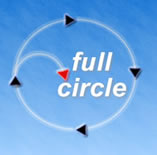
Full Circle > Getting Started >
Teaching digital information fluency: FAQ
by Carl Heine and Dennis O'Connor

Over the years we've received sage advice about our resources: make them easy to use. At times our site was a busy array of choices: Wizard Tools, MicroModules, Lesson Plans, Workshop Materials, Annotated Links, News--the list filled three columns. It overwhelmed many who came to our site. Although attaining information fluency involves a tangled nexus of knowledge and skills and requires numerous resources, we felt we were limiting their use by the way we presented them.
Consequently, we redesigned our web site in 2005 and again in 2015, adopting the format you see today. We believed that fewer, more descriptive keywords on the page and a directory would make it easier to navigate.
The problem that remained may be summed up this way: "how should I use these resources?" Our goal is to provide examples of their effective application by bundling resources in cohesive chunks known as Full Circle Resource Kits. Each Kit has a theme around which we target new and existing resources.
We remain concerned about how user-friendly the Kits are. This article is devoted to how we envision their use, addressing the question: "How can these resources be used effectively?" If you've ever asked this question or one of those listed below, we hope you'll find the answers in this Kit.
- Where do I start?
- How do I find resources?
- What if I only have five minutes?
- What if I only need the basics?
- What if I want to do something more extensive?
- What if I teach a different subject matter?
- What's the best way to assess my students' skills?
- What if I want to plan professional development?
- What if I'm a public librarian?
- What if I only want to use the games?
- What do you have for teaching search skills?
- What do you have for teaching evaluation?
- What if I want to contribute an article?
- What if I want to customize materials?
Where do I start?
Live Search Challenge - Find out what your students can and cannot do -- choose an appropriate Live Search Challenge. These are rated by elementary (requires some search experience), intermediate (requires solid keyword skills) or advanced (involves multiple search strategies).
Keyword Challenge - If students have trouble finding relevant information, start by turning questions into queries with any Keyword Challenge.
Evaluation Kit - If students can find information satisfactorily, but they aren't evaluating it, start with contents of the Evaluation Kit (Kit 1.4).
How do I find resources?
In addition to Resource Kits being grouped thematically, we've created three Indices to help you find just the resources you need:
Master Index - this index lists all the contents of the Resource Kits by category: lead articles, podcasts, curriculum, etc. Use the search engine or browse the titles to find articles, tips, assessments, interactive games and online resources.
Information Fluency Index - this index starts with Digital Information Fluency Core Competencies and catalogs the contents of all Resource Kits by the skills and knowledge addressed. This index also includes ISTE-NETS standards alongside core competencies.
Action Zone Index - This is a catalog of all the Flash tutorial games on our portal, starting with Live Search Challenges, providing brief descriptions that include the level of difficulty, Information Fluency core competencies and applicable ISTE-NETS standards.
What if I only have five minutes?
QuickPick - Use an appropriate Quick Pick activity with students. These are intended to be completed in a few minutes. Each tip concentrates on a specialized skill. Treated in isolation, these bite-sized units probably won't have a long-term impact. For better results, sequence QuickPick activities following the monthly Kit sequence for a logical order to skill training.
Each QuickPick consists of two parts:
- description of the skill/tip to be applied (you may summarize this for students if time is really short)
- practice tasks (this reinforces the concepts and skills and should not be overlooked)
If time for digital information fluency is severely limited, consider getting involved in a curriculum committee, lobbying for more time for information skills.
What if I only need the basics?
Create a Unit - For a list of resources we have created that satisfy basic information fluency requirements, refer to the Basic course components in Create a Unit.
What if I want to do something more extensive?
Create a Unit (intermediate and advanced) - If you need a more comprehensive approach to teaching information fluency, consider creating a course or a unit. The advantage to a unit is continuity--building on previous knowledge and skills.
Digital Investigator - this package models teaching information fluency as part of a ninth grade Language Arts research project.
Information Researcher - the 9 modules of this package may be used as self-paced or classroom instruction.
Website Investigator (WSI) - 4 different cases with tutorials for students to investigate whether the information provided is credible or not.
What if I teach a different subject matter?
Curricular examples used throughout the Full Circle Kits are embedded in Language Arts, Science or Social Studies, since these are the subjects where information fluency research skills are most often called upon in school.
Information fluency skills are flexible and should not be difficult to re-apply in other subjects. See QuickPick: Using Plug-ins as a brief guide to lesson adaptation.
Model Lessons - 6 examples of lesson transformation in Language Arts, Social Studies and Science.
What's the best way to assess my students' skills?
Start with a live Search Challenge. Your students are likely to overestimate their abilities. When they can't find what they are looking for, it makes them aware of their need.
All Search Challenges can be solved in under 10 minutes. Taking longer than that will increase frustration levels.
Link to Search Challenge Index - Know what skill(s) the Search Challenge requires.
Link to Search Challenge Guidelines - Don't use live Search Challenges to 'grade' students.
What if I want to plan professional development?
Information Fluency is a hands-on topic. Use computers. Team people up if there aren't enough computers to go around--it's an effective strategy.
Public Index - Use the index to review the scope of resources that may be appropriate for training your staff. Don't assume they know too much. Like students, many teachers use self-taught strategies that are ineffective.
Assessment Articles and Tools
Essential Search Tutorials:
Ethical Use Tutorials
MicroModule Sequences - stack several tutorials together as part of a workshop. (A sample lesson is also available that you can adapt for your target group.)
What if I'm a public librarian?
Information Fluency tutorials may be used in kiosks around the library.
MicroModules - offer links to self-guided tutorials.
If patrons need help on the basics of searching the Internet direct them to these MicroModules.
- Find Command
- Search Box Strategy
- Search Engines
- What is a Query?
- Deep (Invisible) Web: How Can You Search It?
What if I only want to use the games?
All games are designed around core competencies as self-guided tutorials, so it probably effective to improve one's information fluency just with a steady diet of Search Challenges, Keyword Challenges, Snippet Sleuth, Snowsport, and so on. We haven't tested that hypothesis, but the content of the games is comparable to very sharply focused MicroModules. (We have results to show that working through MicroModules does improve one's performance.)
Each game series has a particular aim, which should be used to strengthen search and evaluation skills:
- Search Challenges -- combines all search and evaluation skills into a real-time authentic search
- Keyword Challenges -- exercises key concept and keyword selection skills for building effective queries
- Archery Challenges -- builds understanding about the type of information that Google and Yahoo cannot find and where to find database information on a web page
- Gold Rush Challenges (California and Klondike)-- improves scanning ability
- Sports Challenges (Snowsport and Soccer) -- exercises key concept and keyword selection, reading snippets for better keywords and ability to use characteristics of word (e.g., hyponyms) to the best advantage
- Snippet Sleuth -- develops skill in reading snippets for information clues
- Bad Apple and Use It? or Lose It? -- strengthens evaluation skills using real and simulated web pages
- Photo Tagging -- develops search skills in Web 2.0 environments that use tagging
What do you have for teaching search skills?
The majority of the resources we have developed are intended to improve searching skills. The Resource Kit editions listed below provide tips and practice in critical aspects of searching:
- Turning Questions into Queries
- Finding the right Database
- Recognizing Relevant Results
- Finding Better Keywords
The order of the Kits follows the logical sequence of the search process and is best utilized in the order shown.
In addition to the Kits, MicroModules provide rich content in each aspect of the search process and may be assigned as individual readings (audio is available to help slower readers) or incorporated as the basis of a classroom presentation. These MicroModules are specific to the search process:
- Search Process
- Search Box Strategy
- Query: What is a Query?
- Using Keywords Effectively
- Search Engines
- Results Ranked: How are Search Results Ranked?
- Subject Indexes
- Sitemaps: What are they and how do they work?
- Deep (Invisible) Web: How Can You Search It?
- Opaque: What is the nearly invisible or opaque web?
- Vanishing Web
- Spelling
- Synonyms
- Hyper- and Hypo- Nyms
- Nyms: How Lesser Known Nyms Help You Improve a Search
- Operators
Search Wizard - this tool uses Google's Advanced Search functions and explains what they are used for. The Wizard provides help on demand:
- Click the Stars -- a pop-up box provides an explanation of the feature
What do you have for teaching evaluation?
A series of 10 MicroModules is dedicated to specific criteria that are critical in determining the credibility of information and its source. These may be assigned as individual readings (audio is available to help slower readers) or incorporated as the basis of a classroom presentation and discussion. These MicroModules are specific to the evaluation process:
- Accuracy
- Author: Who Wrote This Web Page?
- Bias
- Date: How Recently was the Page Published or Updated?
- Evidence
- Expertise
- Links From
- Links To
- Publisher: Who Published This Web Site?
- Traditional Sources
Evaluation Wizard - provides five categories of investigation with guiding questions for each that guide students in thinking about the credibility of information and its source. Students may use the Evaluation Wizard to type or paste their findings for each criterion, and print out a report that summarizes their findings.
What if I want to contribute an article?
You are encouraged to share your stories, ideas, research or concerns. We feature a Facebook page and the Internet Search Challenge Blog that serves as the voice of our community. To submit an idea or an article, write to the 21cif team.
What if I want to adapt or customize materials?
Occasionally we hear from someone who wants to customize a Search Challenge or one of the Flash games. We don't share our source code for the games but are quite willing to turn your request into something other subscribers may use. If you have ideas for custom adaptations, write to us at 21cif team.
Resource Kit materials are copyrighted, so if you reprint them or save them in another form, be sure to cite the source!